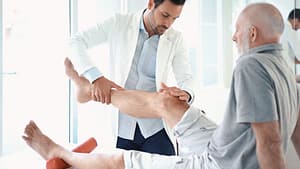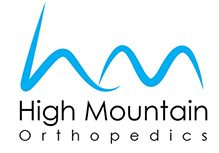Arthritis Orthopedics
 Arthritis causes inflammation in joints and can be acute or chronic in nature. Symptoms typically include pain, stiffness, and structural changes, which may develop slowly over time or appear suddenly. If you’re experiencing painful swelling and stiffness in any of your joints, it could be a sign of arthritis. More than 100 different types of arthritis exist, but the two most common are osteoarthritis and rheumatoid arthritis. Our compassionate, board-certified doctors at High Mountain Orthopedics in Wayne, New Jersey, are skilled in a diverse range of treatment options designed to relieve your arthritis symptoms.
Arthritis causes inflammation in joints and can be acute or chronic in nature. Symptoms typically include pain, stiffness, and structural changes, which may develop slowly over time or appear suddenly. If you’re experiencing painful swelling and stiffness in any of your joints, it could be a sign of arthritis. More than 100 different types of arthritis exist, but the two most common are osteoarthritis and rheumatoid arthritis. Our compassionate, board-certified doctors at High Mountain Orthopedics in Wayne, New Jersey, are skilled in a diverse range of treatment options designed to relieve your arthritis symptoms.
Osteoarthritis
Osteoarthritis is the most common form of arthritis. Because it’s degenerative, osteoarthritis most often occurs in people over the age of 50, but it can affect anyone of any age. Osteoarthritis is caused by wear and tear, so it occurs when the protective cartilage cushioning your joints gradually wears down over time. Osteoarthritis can damage any joint, but it’s the most common form of arthritis in the knee, and it also commonly affects the joints in your hands, hips, and spine.
Osteoarthritis damage to your joints can’t be reversed, but the symptoms can usually be managed. Symptoms typically develop slowly but worsen over time and can include:
- Swelling around the joint
- Pain in the joint during or after movement
- Joint stiffness most notably after being inactive or upon awakening
- Tenderness when applying pressure to or near the affected joint
- Diminished range of motion and loss of flexibility
- Grating sensation and/or crackling or popping sounds when using the joint
- Development of hard lumps of extra bone, called bone spurs, around the affected joint
Certain risk factors can increase the likelihood of developing osteoarthritis, including:
- Growing older
- Being female
- Being obese
- Joint injuries
- Repetitive joint stress from sports or work
- Genetically inheriting the tendency to develop osteoarthritis
- Bone deformities due to birth defects
- Metabolic diseases, including diabetes and hemochromatosis
Because osteoarthritis symptoms worsen over time, joint pain and stiffness can become severe and make daily tasks difficult or even impossible. Chronic pain is common as the disease progresses and sleep disturbances and depression may occur.
Rheumatoid Arthritis
Rheumatoid arthritis is a chronic inflammatory disorder linked to autoimmune dysfunction. It occurs when your immune system makes the mistake of attacking your own body’s tissues, which can affect the lining, ligaments, and tendons of any joint. The result is painful swelling, and eventually, bone erosion and joint deformity that can cause physical disabilities may occur. Inflammation can also damage other body parts, including your eyes, heart, lungs, kidneys, nerve tissue, blood vessels, bone marrow, and skin.
The signs and symptoms of rheumatoid arthritis can vary in severity and may even come and go, which is described as flare-ups and periods of relative remission. Rheumatoid arthritis tends to affect smaller joints first, so you may initially experience symptoms in the joints attaching your toes to your feet and your fingers to your hands. Symptoms can include tender, swollen joints that are stiff, especially after first waking or inactivity, fever, fatigue, and loss of appetite.
While it’s not known what starts the process of rheumatoid arthritis, a genetic component, including a family history of rheumatoid arthritis, seems likely. Other factors that could increase your risk, include:
- Growing older
- Being female
- Smoking cigarettes
- Being obese, especially at a certain age
- Environmental exposures, including asbestos or silica
Arthritis Orthopedics Treatment
The first step in customizing your treatment is the diagnosis, which you should seek as soon as you experience arthritis symptoms. Your doctor will conduct a thorough examination, record a detailed history, and order tests commonly used to diagnose arthritis. Tests often include x-rays, but magnetic resonance imaging (MRI) typically provides more details and may help rule out issues unrelated to arthritis. If we suspect you have any form of arthritis, we order lab tests to check your blood and examine fluid taken directly from the affected joint.
Treatment options may include noninvasive approaches, including weight loss, anti-inflammatories, heat, and cold therapy, stretching, and physical therapy. We may also suggest medical interventions like corticosteroid injections or surgery. When contemplating surgical treatment, we thoroughly evaluate the most appropriate options, from minimally invasive procedures to total joint replacement, depending on which joint is affected and the type and severity of arthritis.
At High Mountain Orthopedics, we proudly serve residents of northern New Jersey from our Wayne location with compassionate orthopedic care tailored to meet your unique needs. Contact us at 973-595-7779 to schedule an appointment or discuss your arthritis concerns today.
Schedule An Appointment Today!
If you or someone you know is in pain, we can help. Take the first step and schedule an appointment.
